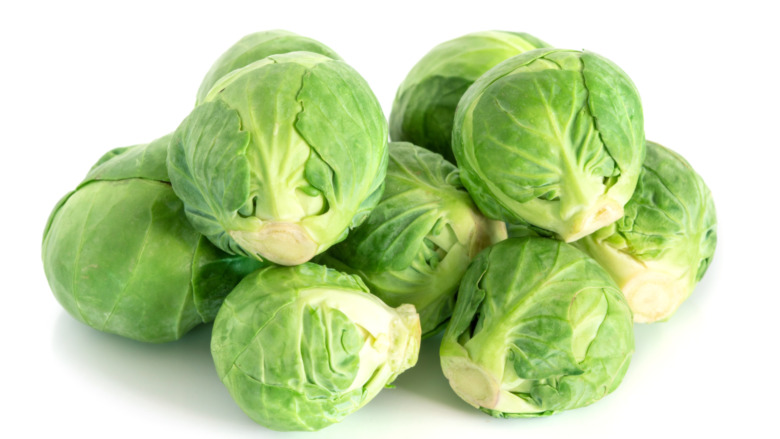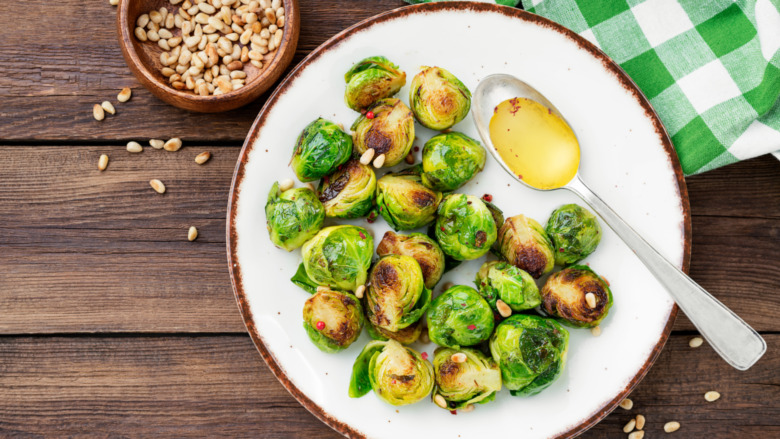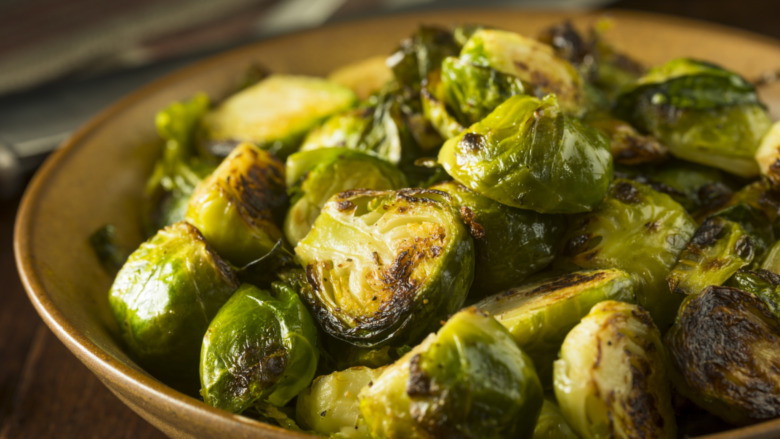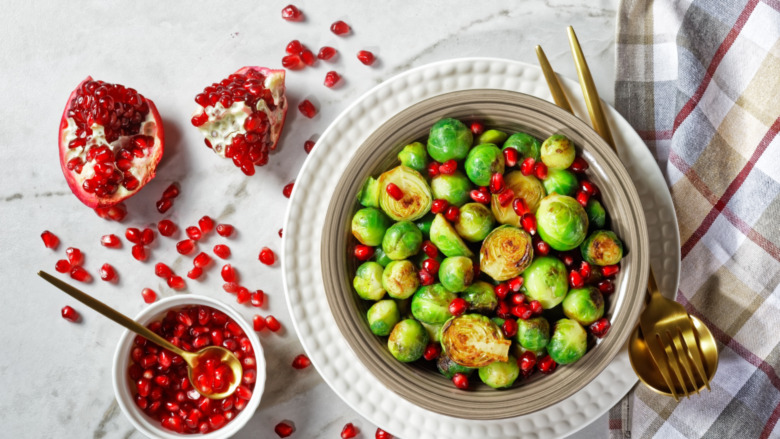The Biggest Mistake You're Making With Brussels Sprouts
It may have never made headlines the way broccoli did when then President George H.W. Bush declared: "I'm president of the United States and I'm not going to eat any more broccoli" (via Slate), but surveys have identified Brussels sprouts as one of the vegetables that people love to hate on — even though the sprouts needn't worry because celery has it worse (via The Courier).
While it may be true that Brussels sprouts can be a divisive vegetable, and that folks are divided into two camps — Hate Them or Can't Live Without Them — it all comes down to how you're cooking the bite-sized cabbages. While a number of home cooks admit that Brussels sprouts can be bitter, that phenomenon doesn't extend to sprouts as a whole because, as writer Vered Guttman explains in Slate, they appear to be temperamental things and fight back by tasting bitter when they are harvested at the wrong time.
Roasting Brussels sprouts brings out the best in them
Because Brussels sprouts already face odds on the flavor front, they can only diminish in appeal after they are cooked. Online vegetable grocer Misfits Market explains that boiling or steaming them can create an end product that's mushy, flavorless, and overall rather unpleasant. No wonder they have so many haters! The secret to irresistible Brussels sprouts is simple — high, dry heat.
Roasting Brussels sprouts allows the vegetable to become caramelized and brings out more of the positive flavors. You don't necessarily need to add much more than oil, salt, and pepper to a pan of roasting sprouts, but as Kitchn reports, don't be stingy with the oil. You want a proper coating of oil in order to get the sprouts crispy in the oven.
You should also be mindful of the size of Brussels sprouts you're working with. Smaller Brussels sprouts are a bit milder in flavor, and you can simply leave them whole and trim off a bit at the bottom. Larger ones, though, should be cut in half, if not quarters, in order to cook properly (via Eating Well). Of course, you can absolutely halve smaller sprouts as well — that simply adds more surface area for roasting.
Once Brussels sprouts are roasted, they can be given a flavor boost
Before you're tempted to just toss them onto a sheet pan and into the oven, take a moment to set yourself up for success by placing them cut-side down. While they'll still get crispy no matter how you place them if they're coated with enough oil and the oven temperature is high enough, putting them cut-side down allows the flat surface to get irresistibly caramelized (via Eating Well).
If you've got perfectly roasted sprouts as your base, you can create a wide variety of absolutely amazing dishes by adding a few additional elements, according to The Cookful. Bacon is always a crowd-pleaser for an extra hit of salt and fat. Cheese might also make the vegetable more palatable; add a sprinkle of Parmesan, blue cheese, ricotta, or goat cheese for a burst of flavor. The options are endless, since Brussels sprouts have a hearty enough flavor to stand up to bolder additions, yet allow the added ingredients to shine. Add some zip with balsamic vinegar or citrus, or a hint of crunch with some nuts. Even something like sautéed onions or shallots swished together with the sprouts can give the vegetable an added boost.
Not everyone is genetically wired to love Brussels sprouts
But if you've done all you can to make these little puppies a palatable side dish for everyone, it could well be that you're doing more than facing down a bunch of particularly picky eaters. Scientists say there is one gene related to taste sensitivity — the TAS2R38 gene — which governs our ability to taste the specific compound that makes Brussels sprouts taste bitter (via Gene Cards).
The Guardian says the gene, which was discovered nearly 100 years ago, actually works with a chemical that is similar to the one that is present in the divisive vegetable, and that's what likely pushes this borderline-flavor vegetable over the edge, making it taste unpleasant. Although the gene was discovered nearly a century ago in 1930, it wasn't until 2003 when scientists were able to definitively say that this particular gene, combined with that particular compound, was what drove some folks to dismiss Brussels sprouts in the way that they have. As an added bonus, Science Focus says that as much as 50 percent of the world's population have this genetic quality.
So the next time you encounter resistance to Brussels sprouts at dinner after you've tried everything to get everyone to enjoy it, you might be better off making a smaller portion of tasty roasted sprouts for those that actually enjoy this much maligned veg.



